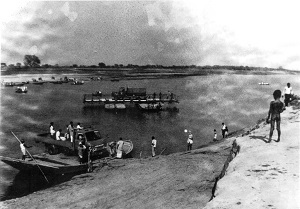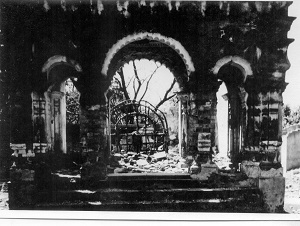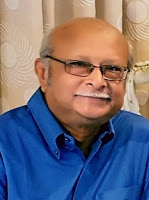Excerpts from an account by an Indian civil servant deputed to oversee rehabilitation of evacuees and distribution of relief materials to the war ravaged, recently independent Bangladesh.
7 p.m., 4th April 1972 at Nawabganj sub-division, Rajshahi district, Bangladesh1. Clustered around a table are: Hafizur Rahman, the young deputy magistrate holding charge of the sub-division; G.Chakravarti and P.K.Samaddar, West Bengal Junior Civil Service probationers at Malda2, and myself. Our objective is to hand over 19 UNICEF trucks to the Deputy Commissioner, Rajshahi district on 5th April, and thus bring to an end Malda’s responsibility for reaching relief materials into the heart of the district.
As we wait for the trucks to be ferried across the Mahananda3, my thoughts wing back to the 4th of April 1961. That day, Lt. Col. G.L.Bhattacharya of the Indian Army had been shot and kidnapped from the Bongaon border by the E.P.R4; and a few months later I found my father sentenced to eight years’ solitary imprisonment in Dacca Central Jail. Now, exactly 11 years later, the police and the magistracy of the same country were pressing me to have rice and chicken curry; the officiating sub-divisional officer has been waiting to receive me without having gone home after office hours; and orders have been sent to Rajshahi circuit house to reserve the best rooms for the ‘I.C.S. (sic)5 officer from Malda.’

Dinner over, Rahman takes leave with the old-world Muslim courtesy and we cross over to the Sibganj6 side of the river where the trucks are lined up to be ferried across. After 9 of them have been taken over to the Nawabganj side, I find to my total consternation that the boatmen are walking away from the ferry. Peremptorily they refuse to work to work anymore and turn a deaf ear to all arguments and pleas that these vehicles are sorely needed by their administration for speeding urgently required food grains to scarcity areas. Some of them remark cynically, “This India, which is pretending to be so very helpful now, will stick a knife into our backs at the slightest opportunity.” It is a comment that I heard time and again in the course of my relief work in Bangladesh and it no longer arouses anger as it used to.
I send Chakravarty and Samaddar across to the police station to see If anything can be done. The drivers have already left for dinner in the town. So, there I am around midnight, sitting on the cool, moist, sandy banks of the Mahananda, whistling to keep my courage and my fast-sinking hopes, and ‘guarding’ the precious trucks. Much good I would be if a gang of miscreants turned up! Suddenly I hear voices raised in argument: yes, it is the resourceful Rahman, successfully tongue-lashing and cajoling the ferrymen back to work. Finally, at 2 a.m. 5th April 1972, all trucks have been ferried across, and we speed through the Stygian darkness to Rajshahi. Half asleep, I recall how it had all begun a couple of months back.

I had first met my District Magistrate, S.P.De on the 5th of January, 1972, the day after I arrived in Malda. He promptly prostrated me with the casual announcement that I was to takeover charge of repatriating 30,000 evacuees to Bangladesh. This I somehow managed to achieve satisfactorily thanks largely to his affectionate guidance, and as a ‘bonus’ he gave me permission to proceed to Rajshahi with 5 truck-loads of blankets on the 31st of January, the day on which the last evacuees left Malda. That is how I got linked up with the Bangladesh Relief work.
In Rajshahi our liaison officer T.K.Das showed me the notorious Goalia Club which had been the Officer’s Mess for the Khan Army7. Prisoners used to be brought here, and after the officers had had their ‘fun’, the bodies used to be dumped into pits dug in the adjoining banks of the river Padma. I saw one of these mass graves with pieces of rope, torn clothes, skulls and bones lying in it.
Das told me that for tackling the crucial problem of raped and pregnant women, the Indian government had arranged facilities for abortions since this was illegal in Bangladesh. Unfortunately, only a few women had come forward. What was required was a dedicated band of social workers who would help these women to overcome their reluctance to come out in the open. However, no social stigma had been attached to their conditions.
The Indian Army was being used extensively in cordoning operations involving the Bihari population8. The Biharis had been isolated and squeezed into tiny pockets. At times, as many as 3000 had been packed into a small primary school without any sanitary facilities whatsoever. In one cordoning operation, the Indian Army Officer had to rush out of one such school, unable to endure the stench and filth, He told me that there was actually an inch- thick layer of flies over the whole area. It was a miracle that they survived such conditions.
This situation was further aggravated in February. The Mukti Fouj9 had, after liberating Dinajpur, killed off around 4000 Biharis who had sided with the Khan Army and summarily forced some 7500 into trains leaving the district. These people had got off at Nawabganj utterly destitute, in a condition of near starvation. In Nawabganj, I was told that they saw no reasons why the new government should feed people who had sided against it, and hence no relief doles were given to these refugees. The situation assumed such proportions that people began to go to the chamber of the SDO with corpses, begging for money to cover burial expenses. This was not refused.
The two major needs faced by Rajshahi district were shelters for returning evacuees, and food grains. Initially the evacuees were being housed in schools but on one of my visits to Sibganj I came across the unbelievable phenomenon of boys gheraoing10 the local Relief Committee with the demand that the schools reopen immediately! To meet this crisis, we began dismantling the camps we had set up for the evacuees, and sent these bamboo structures by trucks to the afflicted areas.
A few curious facts that I came across during my visits to Porsha were that the local M.C.A.11 Basir Ahmed Chowdhury, was so unpopular in his own constituency that he was rarely to be found there! I also met a Mukti Fouj officer who was arranging for stocking the arms that were being surrendered, including rifles, sten-guns, anti-personal mines etc. Curiously, the Pakistani Army did not kill local people within their locality, but always took them elsewhere for ‘disposal’ so that tracing the victims later became an impossible task. The total absence of the usually prolific palm trees was rather striking and on enquiry I was told that the Pakistani soldiers had destroyed all of them because the explosive sound made by the ripe ‘tal’ fruit falling set off false alarms to their guards who thought that they were under attack! Throughout my visits to this area the sumptuous and eager hospitality extended was so effusive as to become painfully embarrassing.
Of the local men, I encountered, ‘Bhutu Babu,’ an amazing man whose exploits read like extracts from Ripley’s ‘Believe it or Not.’ He was a Hindu lawyer of Nawabganj in his early thirties, holding post graduate degrees in Islamic and Modern History from the University of Calcutta and possibly the most popular Awami League12 worker in the area. What struck me was his selfless devotion to his country and its people, and the super human energy and organising ability he displayed. Single-handed, without any help from official quarters, he set up a camp of 580 families of evacuees at Baraghoria in the Sibganj police station with whatever shelter materials we could supply. When ration supplied did not arrive on time, and repeated requests to the SDO Nawabganj had no effect, he simply threatened to prevent the next convoy of food trucks from Malda from proceeding to Nawbaganj, and he was promptly granted his quota!

A similar incident was related by Fazlur Rahman who had been deputed by the Nawabganj sub-divisional committee to receive all relief materials from us. He was an inhabitant of the village Harinagar in Sibganj which used to have a very prosperous community of around 500 weavers. All that was left now was a mass of rubble. Every building had been systematically destroyed including temples. Miraculously the straw effigy of goddess Lakshmi13 emerged unscathed though the temple had broken down.
We used to urge villagers not to lose hope but to set about rebuilding their homes and look forward to a prosperous future for the goddess had not deserted them. Rahman’s entire family played a major role in organizing relief work in the Harinagar area. Though a devoted and indefatigable worker, he lacked Bhutu Babu’s vision and always wanted me to send everything we had to this area first. I was interested to see how this gentleman who was at least 10 to 15 years Bhutu’s senior and a retired officer used to unhesitatingly take orders from him and always sought his advice when in difficulty.
The attitude of the people we were trying to help was another curious amalgam of gratitude, distrust and apathy. For instance, wherever I went, however devastated the area might be, sweets of magnum sizes would appear from nowhere and I would be forced to polish them off on pain of wounding feelings (it is a measure of the pressure of the work that despite these massive doses of sugar and starch, I lost 5 kg between January and April). Whenever I went to Rajshahi I was given a V.I.P treatment and much to my embarrassment was referred to as ‘A.D.C Malda’14 despite all efforts to set them right as to my designation. Of course, they do not have any such post as Assistant Magistrate & Collector and hence my designation never registered in their minds. Resigning myself to it, I used to strut around in borrowed plumes feeling very self-important and thankful for this confusion because it helped me immensely in getting things done fast in Bangladesh. I will never forget the generous hospitality offered to me and other officers from Malda when we visited Dhaka on the 17th of March just as the meeting addressed jointly by Mrs. Indira Gandhi and Sheikh Mujibur15 Rahman was to start by the district judge of Dhaka, Abdul Hannan Chowdhury, affectionately known as ‘judge-saheb.’ The ‘pranhara sandesh’ and the sweet yogurt of the famous confectioners, Maranchand-Kalachand that he loaded us with were nothing short of ambrosia (we were fortunate as they had supplied the same day the ‘pranhara sandesh’16 to be served to the Indian Prime Minister!)
Dr. Pradip Bhattacharya, a retired member of the Indian Civil Service, is a well known author and an authority on Mahabharata. He lives in Kolkata.
Footnotes
- Sub division, district, division: administrative units in South Asia. Rajshahi district which has now been upgraded to a division is on the western borders of Bangladesh with India. Nawabganj to its north is now a district within the division
- Malda, a district on the north east of the eastern province of West Bengal in India, is about 142 km north of Rajshahi, across the international boundary line
- River bordering the two countries, India and Bangladesh
- East Pakistan Rifles, a regiment of Pakistani Army
- I.C.S or Indian Civil Service was a term used during colonial rule. It was changed at the time of independence in 1947 to Indian Administrative Service
- A town across the Mahananda river in Bangladesh
- The army of the President of Pakistan, Yahya Khan. The people of Bangladesh fought against it to gain independence
- People from the province of Bihar to the west of West Bengal in India went as labourers
- Liberation Army of Bangladesh
- A protesting group encircling someone to make a demand
- Porsha, another small town in Sibganj. MCA stands for Member of the Constituent Assembly, the new ‘parliament’ formed in Bangladesh
- The political party formed and led by Mujibur Rahman that led the war and liberation of Bangladesh
- Goddess of wealth in the Hindu pantheon
- Additional Deputy Commissioner, a rank in local bureaucracy used in Pakistan. The author was Assistant Magistrate, training under the District Magistrate and therefore a more junior officer
- Prime Ministers of India and Bangladesh
- A special kind of sweet made of milk, literally meaning one that will steal your heart
